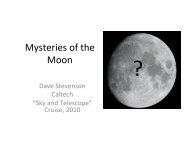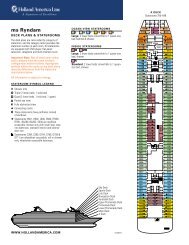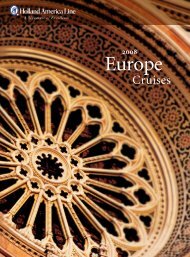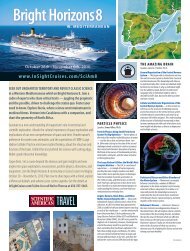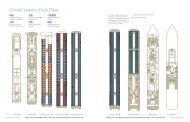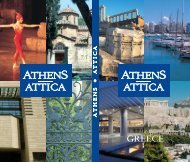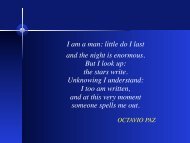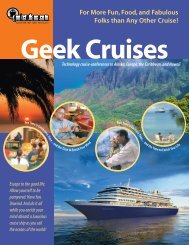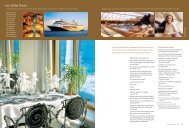Bright Horizons - Insight Cruises
Bright Horizons - Insight Cruises
Bright Horizons - Insight Cruises
You also want an ePaper? Increase the reach of your titles
YUMPU automatically turns print PDFs into web optimized ePapers that Google loves.
<strong>Bright</strong> <strong>Horizons</strong><br />
10<br />
Rome to Athens, October 1–13, 2011<br />
www.InSight<strong>Cruises</strong>.com/SciAm-10<br />
Set a course for intellectual adventure on the Black Sea with your<br />
curiosity as a guide and Scientific American to take care of the details. Join<br />
Scientific American on the <strong>Bright</strong> <strong>Horizons</strong> cruise conference on Holland<br />
America Line’s ms Rotterdam, sailing Rome to Athens October 1–13, 2011.<br />
As you ply the wine-dark seas, join Dr. John Steele in tracing the astronomical<br />
legacies of the Babylonians and Greeks. Dr. Michael Wysessions conveys<br />
the impact of volcanoes and tsunamis in the flow of civilization. Sit with<br />
Dr. Michael Benton as he brings dinosaurs to life. Tune in to Dr. Mohammed<br />
Noor, as he details the nature of species. Get the latest concepts on comets<br />
with Dr. Mark Bailey. Illuminate dark matter with Dr. Lawrence Krauss.<br />
The Draconid meteor shower will punctuate your Black Sea sojourn. Typically a<br />
minor celestial event, the 2011 shower is forecast to be a humdinger.<br />
Cover new terrain, from Rome to Odesa to the Kuiper Belt. Celebrate ancient<br />
civilizations and the current moment with a friend. Find the how-tos and<br />
details at www.InSight<strong>Cruises</strong>.com/SciAm-10 and join kindred spirits on a<br />
voyage of discovery.<br />
ITALY<br />
CIVITAVECCHIA<br />
(ROME)<br />
Katákolon<br />
(Olympia)<br />
PIRAEUS<br />
(ATHENS)<br />
GREECE<br />
Varna<br />
BULGARIA<br />
Odessa<br />
Santoríni<br />
UKRAINE<br />
B L A C K<br />
TURKEY<br />
Kuşadasi<br />
(Ephesus)<br />
Yalta<br />
S E A<br />
Istanbul<br />
Cruise prices vary from $1,799<br />
for an Interior Stateroom to<br />
$5,299 for a Deluxe Suite, per<br />
person. For those attending<br />
our program, there is a<br />
$1,475 fee. Government<br />
taxes, port fees, and InSight<br />
<strong>Cruises</strong>’ service charge are<br />
$208.91 per person.<br />
For more info please call<br />
650-787-5665 or email us at<br />
Concierge@InSight<strong>Cruises</strong>.com<br />
COSMOLOGY<br />
Speaker: Lawrence Krauss, Ph.D.<br />
Quantum Man: Richard Feynman’s Life in<br />
Science — It took a man who was willing to break<br />
all the rules to tame a theory that breaks all the<br />
rules. Learn about the scientific legacy of one of the<br />
greatest and most colorful scientists of the 20th<br />
century, and in turn get insights into the questions<br />
driving the science of the 21st century.<br />
An Atom from Greece — Every atom in your<br />
body was once inside a star that exploded. Lawrence<br />
Krauss will present the life history of an atom in a<br />
glass of wine you will have with dinner, from the<br />
beginning of the universe to the end. The story is rich<br />
in drama and surprises, and will leave you thinking<br />
differently about your place in the cosmos.<br />
The Dark Side of the Universe: From Black<br />
Holes, to Dark Matter, and Dark Energy<br />
— The most interesting things in the universe<br />
apparently cannot be seen. Learn why scientists are<br />
fascinated by them, and why they hold the key to<br />
understanding our origins, and our future.<br />
Hiding in the Mirror: Extra Dimensions,<br />
CERN, and the Universe — The largest machine<br />
humans have ever built has turned on in Geneva, and<br />
happily has not created a black hole that destroyed<br />
the world. But what might be discovered there, and<br />
will it tell us that there is, literally, infinitely more<br />
to the universe than meets the eye?<br />
CST# 2065380-40<br />
VATICAN OBSERVATORY<br />
When in Rome, do as the Romans who are astronomy<br />
buffs wish they could do—visit to the new digs of the<br />
Vatican Observatory and get a privileged look at its<br />
world-class meteorite collection.<br />
Join <strong>Bright</strong> <strong>Horizons</strong> on an optional pre-cruise trip<br />
to Castel Gandolfo, Italy on a private insider’s tour<br />
ISTANBUL TOUR<br />
It’s impossible to describe, and has mesmerized<br />
travelers for millennia. Layered, amalgamated,<br />
flowing. Ancient and modern, secular and sacred.<br />
Plunge into Istanbul’s cultural whirlwind with <strong>Bright</strong><br />
<strong>Horizons</strong> staff, who have been there, done that.<br />
On your itinerary: Hagia Sophia. It was the largest<br />
cathedral in the world for a thousand years, then<br />
a mosque, now a secular museum (so Istanbul).<br />
The Blue Mosque is defined by its 20,000 Iznik<br />
tiles. We’ll peruse the sweets, spices, and nuts at<br />
the Spice Bazaar (A little hazelnut-pomegranate<br />
nougat, perhaps?).<br />
PALEONTOLOGY<br />
Speaker: Michael J. Benton, Ph.D.<br />
The Life and Times of the Dinosaurs — Many<br />
people think images of dinosaurs in museums<br />
and films are largely imaginary. Find out how<br />
paleobiologists reconstruct the life of the past<br />
using a combination of three modern scientific<br />
methods. Dr. Benton will share the standard tools,<br />
unexpected finds, and new engineering approach<br />
to understanding how these ancient giants looked,<br />
moved, and fed, putting dinosaur discoveries and<br />
imagery in a new light.<br />
Origins and Extinctions — Life has existed on<br />
Earth for four billion years, punctuated by origins<br />
and extinctions. From the origin of life to the<br />
origin of humans we’ll look at one of the grandest<br />
questions in science: where did we come from<br />
… and can we be sure? Dr. Benton then explores<br />
international research from North America, Russia,<br />
China, and Europe on the causes and consequences<br />
of extinctions.<br />
Origins of Modern Biodiversity — Life today<br />
is hugely diverse. Darwin wondered at this richness,<br />
and argued that life was more diverse than it<br />
had to be! Research efforts now concentrate on<br />
reconstructing the evolutionary ‘tree of life’ using<br />
genomes and fossils, bound by massive computing<br />
power. Get the scoop on biodiversity and the latest<br />
on biogeographic investigations, fossil data, and<br />
number crunching of the new genomic sequences.<br />
The Dinosaurs of Eastern Europe and the<br />
Mediterranean — In the days of the dinosaurs,<br />
continental drift and sea level change led to<br />
ever-changing geography. See how geologists<br />
create paleogeographic maps to locate the dinosaur<br />
fauna of what is now Eastern Europe. Meet colorful<br />
characters from early days of paleontology. Learn<br />
how regional research changed during the Iron<br />
Curtain days and how current researchers are<br />
bringing Europe’s unique dinosaurs back to life.<br />
of the Observatory’s laboratory, home to a 135<br />
kg collection of 1081 samples, from 469 meteor<br />
falls. See a bit of Mars on your Mediterranean<br />
trip! Perhaps almost more intriguing is the<br />
Observatory’s library. We’ll browse over the<br />
shoulders of giants, seeing historic and antique<br />
astronomy books including early editions of<br />
Newton, Copernicus, Galileo, Kepler, Brahe,<br />
Clavius, and Secchi. VO astronomers will brief us<br />
on the Vatican’s interest in astronomy and the<br />
latest on VO research at Steward Observatory,<br />
Mount Graham, Arizona.<br />
We’ll lunch on the shores of Lake Albano, an<br />
extinct volcano, and linger to enjoy the scenic and<br />
historic nature of the Castel Gandolfo area before<br />
returning to the bustle of Rome.<br />
Onward to our learning lab in Turkish hospitality,<br />
doing lunch at Topkapi Palace’s former guard<br />
house. Then we’ll immerse ourselves in the<br />
context and treasures of Topkapi, including the<br />
Treasury, Harem, and Holy Relics sections. Risking<br />
total sensory overload, we’ll conclude our day at<br />
the Istanbul Archaeology Museum.
COMETS<br />
Speaker: Mark Bailey, Ph.D.<br />
Meteors, Meteor Showers, and the<br />
Draconids — Meteors or shooting stars are<br />
fragments of dust from comets, burning up in<br />
the Earth’s atmosphere. The time of this lecture<br />
coincides with a predicted outburst of the annual<br />
Draconid meteor shower. It is expected that<br />
activity will increase to a peak over a 2- to 3-hour<br />
period beginning around 8pm, with up to several<br />
hundred meteors per hour possibly being seen,<br />
depending on local weather conditions. After a brief<br />
introduction to meteors and meteor storms, we go<br />
up on deck to observe the “dragon’s” fiery flame.<br />
Comets and Concepts in History — Humans<br />
have a love-hate relationship with comets.<br />
We’ll look at the oldest theories of the nature of<br />
comets and the role they played in astronomy’s<br />
development. Blaze a trail with Dr. Bailey through<br />
the historic observations, arguments, and theories<br />
leading to the realization that comets are largely<br />
Oort cloud products, formed with the Sun and<br />
planets 4.5 billion years ago.<br />
The Life, Times, and Persistent Puzzles of<br />
Comets —Broaden your horizons delving into<br />
20 years’ worth of discoveries on comets and their<br />
origins — whether in the Edgeworth-Kuiper belt<br />
just beyond Neptune, the trans-Neptunian disc,<br />
or the Oort cloud. Survey the natural history of<br />
comets in the inner solar system, and discover the<br />
persistent puzzles and uncertainties in this vibrant,<br />
active field of solar-system research.<br />
Risks Posed by Comets and Asteroids —<br />
Comets occasionally descend on the Earth with<br />
catastrophic effect. At one extreme, such impacts<br />
can change the course of evolution disrupting the<br />
normal “Darwinian” process. At another extreme,<br />
relatively small impacts may have important<br />
implications for the development of civilization.<br />
Find out how the risk of rare, high-consequence<br />
events is assessed.<br />
ANCIENT ASTRONOMY<br />
Speaker: John Steele, Ph.D.<br />
Astronomy in Ancient Babylon —Cuneiform<br />
writing on thousands of clay tablets documents the<br />
astronomical activity of the ancient Babylonians.<br />
These texts circa the first millennium BC,<br />
include lists of astrological omens, astronomical<br />
observations, and calculations of the positions and<br />
phenomena of the moon and the planets. Join Dr.<br />
Steele to investigate the astronomical traditions<br />
of the ancient Babylonians and their invention of<br />
scientific astronomy.<br />
Ancient Greek Astronomy — How could<br />
Ptolemy insist that the earth was the center of<br />
the Universe? The ancient Greeks didn’t invent<br />
astronomy, but they were the first to combine<br />
philosophy with mathematics to model the<br />
motion of the heavens using geometry. Along<br />
the way they figured out the size of the Earth,<br />
the distance of the moon from the Earth, and<br />
developed geometrical methods for modeling<br />
planetary motion. Delve into the legacy of Greek<br />
astronomy, and trace its impact in the medieval<br />
Islamic world and Renaissance Europe.<br />
EVOLUTION<br />
Speaker: Mohamed Noor, Ph.D.<br />
What is “Evolution” Anyway and Why Should<br />
I Care? — The mere word “evolution” conjures<br />
images in the public ranging from movie dinosaurs<br />
to something vaguely half-human-half-gorilla.<br />
What does the word evolution actually mean in<br />
the biological sciences, what is the evidence that<br />
it is true, and why should the general public know<br />
and care? In fact, evolution affects your everyday<br />
life, from your health to your livelihood — come<br />
learn why!<br />
On the Origin of Species, Really — Although<br />
Darwin’s book title suggested that he defined the<br />
origin of species, in fact, he only focused on the<br />
process of divergence within species and assumed<br />
the same processes “eventually” led to something<br />
that could be called a new species. Dr. Noor will<br />
talk about how species are identified (in practice<br />
and in principle), how to modern evolutionary<br />
biologists use this type of information to get a<br />
handle on how species are formed, and what<br />
questions remain.<br />
Genetics, Genomics, and You: Don’t Fear Your<br />
Genotype! — The missing element to Darwin’s<br />
theory was how it worked in terms of inheritance.<br />
Genetics answered that. Today “personal genomics”<br />
issues span medical, legal, ethical, and other areas<br />
and pose big question. Get ready for discussion<br />
and a lab exercise to help understand the lingo,<br />
opportunities, and issues associated with living in<br />
the genomics era.<br />
Life in the US Academic Sciences — What<br />
happens behind closed doors in the “Ivory Tower”<br />
of an academic scientist? Scientists at universities<br />
juggle multiple roles. What do these people actually<br />
do all day? What are these scientists trained well<br />
to do and what are areas where they really are not<br />
trained well? What is a typical career trajectory in<br />
the sciences, and how are scientists evaluated? Get<br />
an inside look from a noted academic.<br />
The Antikythera Mechanism: An Ancient<br />
Mechanical Universe — In 1900 sponge divers off<br />
the tiny island of Antikythera discovered an ancient<br />
Roman shipwreck laden with works of art. Almost<br />
unnoticed were the poorly preserved remains of<br />
a small mechanical device — the Antikythera<br />
Mechanism. Through painstaking reconstruction<br />
and analysis over the past century, we now know<br />
the device was a mechanical astronomical computer<br />
of great ingenuity. Learn the story of research on<br />
the mechanism — and what it has revealed about<br />
ancient Greek science and technology.<br />
Eclipses in History — Eclipses are one of<br />
the most awe-inspiring astronomical events.<br />
Throughout history eclipses were viewed with fear,<br />
excitement, astonishment, and scientific curiosity.<br />
Take a look at how eclipses have been observed,<br />
interpreted, and commemorated in different<br />
cultures around the world and discover how<br />
scientists today benefit from ancient eclipse records.<br />
DRACONID METEOR SHOWER<br />
“Every year around Oct. 8th, Earth passes<br />
through a minefield of dusty debris from<br />
Comet Giacobini-Zinner, source of the annual<br />
Draconid meteor shower. On Oct. 8, 2011,<br />
Earth will have a near head-on collision with<br />
a tendril of dust, setting off a strong outburst<br />
of as many as 750 meteors per hour. People in<br />
Europe, Africa and the Middle East will have a<br />
front-row seat for what could be the strongest<br />
shower since the Leonid storms a decade ago.”<br />
From SpaceWeather.com.<br />
ATHENS’ BEST<br />
Visit the new Acropolis Museum and the National<br />
Archaeological Museum with our skilled guide<br />
who will add immeasurably to your experience.<br />
See the Parthenon frieze, exquisite sanctuary<br />
relics, and Archaic sculpture at the Acropolis<br />
Museum. Lunch, of course, is tucked away at a<br />
taverna favored by Athenian families. For dessert,<br />
we’ll visit the richest array of Greek antiquities<br />
anywhere at the National Archaeological Museum.<br />
EPHESUS<br />
Many civilizations left their mark at Ephesus. It’s a<br />
many layered, many splendored history, often<br />
oversimplified. <strong>Bright</strong> <strong>Horizons</strong> pulls together<br />
three important elements of Ephesus rarely<br />
GEOLOGY<br />
Speaker: Michael Wysession, Ph.D.<br />
Changing Climates, the Black Sea Flood, and<br />
the Rise of Civilization — The philosopher Will<br />
Durant said, “Civilization exists by geologic consent,<br />
subject to change without notice.” The history of<br />
climate change illustrates this richly. Dr. Wysession<br />
lays out the factors controling the climate and how<br />
climate change has been the driving factor for the<br />
course of human history. You’ll get a detailed look<br />
at the Black Sea Flood of 7500 years ago, and enrich<br />
your understanding of the impact of climate change.<br />
Santorini and the History of Megatsunamis<br />
— 3600 years ago, Thera/Santorini saw one of most<br />
powerful volcanic eruptions known, leaving just the<br />
island ring we see today, burying the Minoan city of<br />
Akrotiri under 60 feet of ash, creating a megatsunami<br />
that devastated the entire Mediterranean. The the<br />
U.S. Northwest’s 1700 M-9 earthquake, Lisbon’s 1755<br />
quake, Krakatoa’s 1883 eruption, and the devastating<br />
Sumatra 2004 quake created similarly catastrophic<br />
tsunamis. Survey the terrain of megatsunamis, and<br />
learn potential future tsunami triggers.<br />
presented together. Meander the Marble Road,<br />
visit the legendary latrines, check out the Library,<br />
and visit the centers of the city. A visit to the<br />
Terrace Houses enlivens your picture of Roman<br />
Ephesus. Lunch on Mediterranean cuisine in the<br />
countryside, and then visit the Ephesus Museum<br />
where you get a fuller look at local history, from<br />
the Lydians to the Byzantines.<br />
The Eruption of Vesuvius and the Impact<br />
of Volcanoes — The term “Plinian volcanic<br />
eruptions” honors Pliny the Elder who chronicled<br />
the 79 CE eruption of Vesuvius. These eruptions<br />
eject ash high in the atmosphere, having their<br />
greatest impact through global climate change.<br />
From Peru to Russia, from eruptions 74,000 BCE to<br />
the French Revolution, you’ll focus on the impact<br />
of volcanos on history. Time well spent with Dr.<br />
Wysession, who keeps his eye on the Yellowstone<br />
Caldera!<br />
Fermi’s Paradox and the Likelihood of<br />
Finding Another Earth — During a discussion<br />
on the likelihood of intelligent civilizations existing<br />
elsewhere, the physicist Enrico Fermi asked “Well,<br />
where is everybody?” Geologic research shows that<br />
the conditions required for life to exist continuously<br />
for nearly four billion years are stringent, and may<br />
rarely occur in the galaxy. Learn all of the factors<br />
that had to happen just right to produce Earth’s<br />
spectacular and potentially unique diversity of<br />
geologic and biologic environments.<br />
© Wally Pacholka / AstroPics.com



